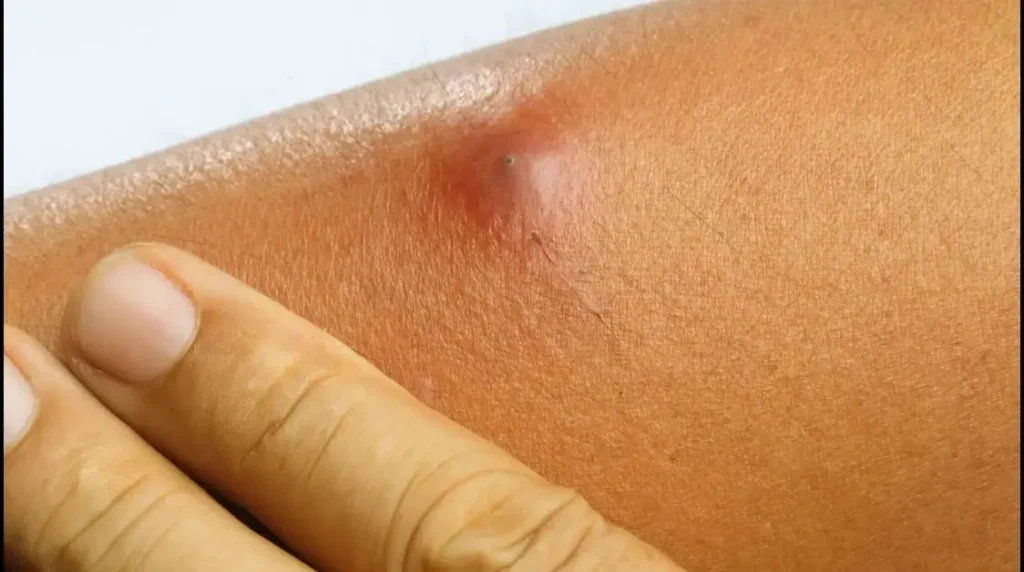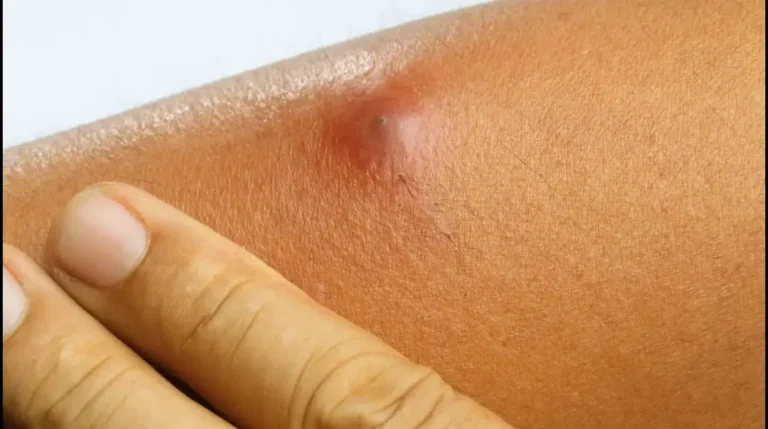Can stress cause boils? This question comes to all of our minds, which is rarely discussed. Stress does not have a direct effect on boils. Since excess stress is related to our skin and health, it is important for us to understand them.
Table of Contents
ToggleWhat is boils?
Before knowing whether there is any connection between stress and boils, you need to know what boils are.
Boils are pus-filled, painful bumps that develop under the skin. It is mainly caused by bacterial infection and can be located anywhere in the body. At first, it is small and red, and then it becomes bigger and more painful.
What causes boils?
It is mainly caused by bacterial infection. Apart from this, there are other major factors like- low immunity, poor diet, irregular sleep, and dirty skin that can lead to boils.
Also, this problem can be doubled for those who wear tight, synthetic, or polyester clothes. Because bacteria grow very quickly on these clothes.
What is the connection of boils with stress?
Various studies have shown that stress has no direct effect on boils. But we have to remember that excessive stress can damage our health and skin.
Due to excessive stress, our body’s immune system weakens, thereby reducing the ability to fight disease. As a result of this weak immune system, our body does not have the ability to fight against various germs and bacteria, which can also lead to the formation of boils.
It also increases the oiliness of our skin, which can lead to acne, eczema, and other diseases besides boils. So it can be said that continuous stress does not have a direct effect on the formation of boils, but it does have an indirect effect. So it is necessary to be careful.
Risk factors for boils
Having a strong immune system in our body can protect us from various infections and diseases. But when the immune system is weakened due to various reasons, our body loses its ability to fight bacteria and infections, resulting in various diseases, one of which is boils. It can increase due to various reasons. For example-
1) Due to a dirty environment:-
Bacteria can grow easily in a dirty environment, leading to various skin infections. Living in this dirty environment increases the chances of getting boils.
2) Bad eating habits:-
A bad diet weakens our immune system. Which causes boils to grow.
3) Due to diabetes:-
Chronic diseases such as diabetes double the risk of various infections, including boils.
4) Other skin infections:-
Skin infections like eczema and acne can increase the risk of boils.
5) Due to stress:-
Stress can also play a role in causing boils to grow. Due to excess stress, our immune system becomes weak. This can lead to a high chance of boil formation.
How to treat boils at home?
In most cases, boils can be treated at home. Some home remedies for boils are discussed below.
First, clean the area around the boil. Then wash thoroughly with soap or any antibiotic. After drying the area, apply gentle heat three to four times a day, as warmth softens the boil quickly. Do this until it is drained.
Another good method is to first take a clean cloth and then soak the cloth in warm water. Then keep pressing gently for 15 minutes, do this 3-4 times throughout the day, and the boil will drain easily.
However, it should be remembered that most of the time boils can be treated at home, but in some cases, when the boil increases in size or is repeated and causes unbearable pain, it is necessary to consult a good doctor.
How to prevent boils?
Boils are caused primarily by bacteria entering the skin, which can spread due to various reasons and lead to skin infections, including boils. But it can be prevented by taking some steps.
Hygiene should be maintained:–
Bacteria can be prevented by practicing good hygiene. Bath daily, wash your hands with soap, and keep your living area clean.
Avoid sharing personal items with anyone:–
Don’t share clothes, towels, shoes, and razors with others. Because bacteria spread very quickly through them.
Wear loose clothes:-
Wearing very tight and synthetic type clothing promotes bacterial growth and increases the chances of boil formation.
If these hygiene rules are followed properly, it will be possible to keep the skin free from bacteria and get rid of boils.
How to control excess stress?
Keeping stress under control is very important for our physical and skin health. Some methods of stress management are discussed below-
- Eat healthy foods. These foods include green vegetables, fruits, fish, whole grains, nuts and seeds, salmon, etc.
- It is very important to exercise for at least 30 to 40 minutes every day. It is good for both physical and mental health.
- Regular sleep. 7 to 8 hours of sleep every day helps us to reduce stress.
- Consult a specialist doctor as needed.
When should a doctor be consulted?
Boils usually do not require a visit to the doctor, as they can be treated with home remedies. But in some cases, a doctor is needed, especially when the boil stays in the same position for a week and causes severe pain and fever; a good doctor’s advice is needed.
Also, if an infection develops around the area after the boil has ruptured and it spreads rapidly, a doctor should be consulted as soon as possible.
Conclusion:-
Finally, it can be said that there is no direct effect of stress and boils. Excess stress affects our health and skin, which increases the chance of boils. So to avoid it, we should take proper measures like eating healthy food, drinking more water, staying clean, and most importantly, keeping stress under control. We need to master everything from how to manage stress to how to care for the boil. A good doctor should be consulted if needed.
Frequently asked questions:–
1/ At least how many days does it take for the boil to heal?
Ans- It takes approximately 1-2 weeks to heal, depending on the size of the boil.
2/ What should be done to avoid boils?
Ans- Must be clean, keep stress under control, and eat well.
3/ Can boils be contagious?
Ans- Yes, it can be contagious. It can occur in different parts of the body mainly due to bacterial infection.








1 thought on “Can Stress Cause Boils? Exploring the Connection”
Сохранил в архив, понравилось ваш проект!